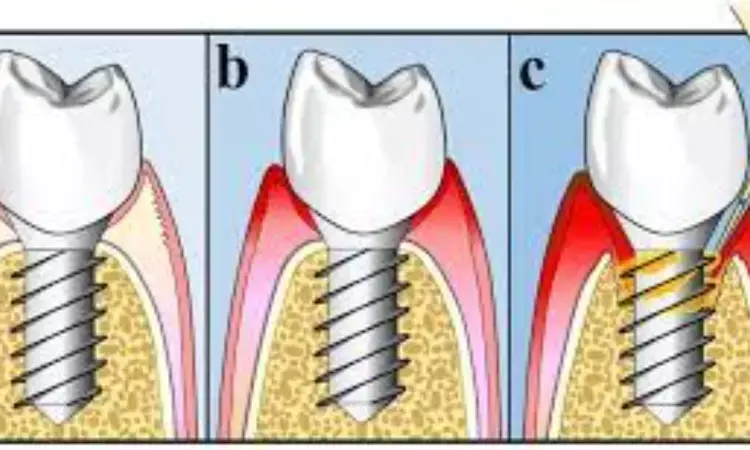- Home
- Medical news & Guidelines
- Anesthesiology
- Cardiology and CTVS
- Critical Care
- Dentistry
- Dermatology
- Diabetes and Endocrinology
- ENT
- Gastroenterology
- Medicine
- Nephrology
- Neurology
- Obstretics-Gynaecology
- Oncology
- Ophthalmology
- Orthopaedics
- Pediatrics-Neonatology
- Psychiatry
- Pulmonology
- Radiology
- Surgery
- Urology
- Laboratory Medicine
- Diet
- Nursing
- Paramedical
- Physiotherapy
- Health news
- Fact Check
- Bone Health Fact Check
- Brain Health Fact Check
- Cancer Related Fact Check
- Child Care Fact Check
- Dental and oral health fact check
- Diabetes and metabolic health fact check
- Diet and Nutrition Fact Check
- Eye and ENT Care Fact Check
- Fitness fact check
- Gut health fact check
- Heart health fact check
- Kidney health fact check
- Medical education fact check
- Men's health fact check
- Respiratory fact check
- Skin and hair care fact check
- Vaccine and Immunization fact check
- Women's health fact check
- AYUSH
- State News
- Andaman and Nicobar Islands
- Andhra Pradesh
- Arunachal Pradesh
- Assam
- Bihar
- Chandigarh
- Chattisgarh
- Dadra and Nagar Haveli
- Daman and Diu
- Delhi
- Goa
- Gujarat
- Haryana
- Himachal Pradesh
- Jammu & Kashmir
- Jharkhand
- Karnataka
- Kerala
- Ladakh
- Lakshadweep
- Madhya Pradesh
- Maharashtra
- Manipur
- Meghalaya
- Mizoram
- Nagaland
- Odisha
- Puducherry
- Punjab
- Rajasthan
- Sikkim
- Tamil Nadu
- Telangana
- Tripura
- Uttar Pradesh
- Uttrakhand
- West Bengal
- Medical Education
- Industry
Antibiofilm effect of Ozonized saline solution effective in peri-implant diseases

Ozonized saline solution has antibiofilm activity, and thus a promising candidate therapy for the treatment of peri-implant diseases, suggests a recent study published in the Journal of Periodontology.
Removal of dental plaque and local application of local chemical adjuncts, such as chlorhexidine (CHX), have been used to control and treat peri-implant disease. However, these methods can damage the surface properties of the implants or promote bacterial resistance. The application of ozone as an adjunctive treatment represents a new approach in the management of peri-implantitis. Thus, the purpose of this study was to evaluate the antimicrobial effect of ozonized physiological saline solution in different concentrations against oral biofilms developed on titanium surface.
Single and multi-species biofilms of Porphyromonas gingivalis, Fusobacterium nucleatum, and Streptococcus oralis were formed on titanium specimens for 5 days in anaerobic conditions. Biofilms were treated with ozonized saline solution at different concentrations (25, 50, and 80 μg/NmL), for 30 seconds and 1 minute. CHX (0.12%) and saline solution (0.89% NaCl) were used as positive and negative controls, respectively. Bacterial viability was quantified by colony forming units (CFU mL−1), and biofilm images were acquired by confocal laser scanning microscopy (CLSM). Data were analyzed by parametric test (ANOVA) with Tukey post-hoc test (P < 0.05).
Results of the study are:
Ozonized saline solution showed antibiofilm activity at a concentration of 80 μg/NmL for 30 seconds and 1 minute, reducing, mainly, Porphyromonas gingivalis viability, with 2.78 and 1.7 log10 CFU mL−1 of reduction in both single and multi-species biofilms, respectively, when compared to the control (saline), whereas CHX reduced 1.4 and 1.2 log10 CFU mL−1.
Thus, the researchers concluded that Ozonized saline solution has antibiofilm activity, with better effect when applied for 1 minute at 80 μg/NmL, being a promising candidate therapy for the treatment of peri-implant diseases.
Reference:
Antibiofilm effect of ozonized physiological saline solution on peri-implant–related biofilm by Caroline C. Tonon et al. published in the Journal of Periodontology.
https://aap.onlinelibrary.wiley.com/doi/abs/10.1002/JPER.20-0333
Dr. Shravani Dali has completed her BDS from Pravara institute of medical sciences, loni. Following which she extensively worked in the healthcare sector for 2+ years. She has been actively involved in writing blogs in field of health and wellness. Currently she is pursuing her Masters of public health-health administration from Tata institute of social sciences. She can be contacted at editorial@medicaldialogues.in.
Dr Kamal Kant Kohli-MBBS, DTCD- a chest specialist with more than 30 years of practice and a flair for writing clinical articles, Dr Kamal Kant Kohli joined Medical Dialogues as a Chief Editor of Medical News. Besides writing articles, as an editor, he proofreads and verifies all the medical content published on Medical Dialogues including those coming from journals, studies,medical conferences,guidelines etc. Email: drkohli@medicaldialogues.in. Contact no. 011-43720751


